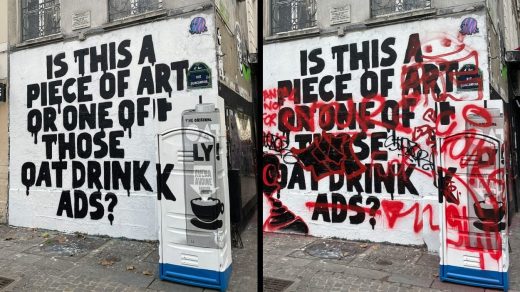Oatly’s fake graffiti invites real protest in Paris
During a trip to Paris last week, I noticed a huge wall mural with chunky black letters on a white background. “Is this a piece of art or one of those oat drink ads?” the copy read.
It was so stark against the tan-colored buildings of the historic Beaubourg district that I snapped a photo. A few days later, I returned to find that the mural had been tagged from top to bottom, perhaps proving too irresistible for some wanton passerby with a handy can of red spray paint.
Another way to read the defacement was not as a random act of graffiti but as a statement on a statement of the limits of meta advertising. The mural, it turned out, was part of a broader outdoor ad campaign from Oatly, the Swedish maker of nondairy milk alternatives, which was celebrating its entry into the Paris market with messages that intentionally aimed to subvert local restrictions on wall murals while also blurring the lines between advertising and art.
You see, Paris is a city that takes its visual pollution seriously. Wall murals that brandish product images or logos are not typically allowed, as Oatly’s creative director, Oskar Pernefeldt, explained in a LinkedIn post. Oatly’s workaround was to include only the lettering itself on the actual murals, and then add the product images via separate objects. A truck or a pallet of boxes could then be placed in front of the murals, lining up to create a forced-perspective effect when filmed from certain angles.
Whatever your thoughts on advertising that winks and nods at consumers (as if advertising hasn’t already made us all too cynical to wink back), the campaign was wholly original and clever. Not only did it tackle the insurmountable challenge of passing muster with French bureaucrats, but it resulted in deliciously ready-made content for the social era. Perhaps that helps explain why the campaign has been so widely praised on the very social platforms it was engineered for.
But it doesn’t come off nearly as clever in person, or at least it didn’t to me. And judging by the reaction of so many graffiti artists who have put their own personal stamps on Oatly’s ads—I’m not alone.
TikTok creator Ashley Rutstein deftly summed up the local reaction in a widely viewed video, pointing out that Paris’s restrictions on murals exist for a reason: to protect inhabitants who roam its streets day in and day out from exactly the kind of brand incursion that Oatly managed to pull off. Among the 600-plus commenters on Rutstein’s video were observers who wondered aloud why the ads weren’t in French, or why the company wouldn’t anticipate the barrage of locals who instantly wanted these murals defaced. Which raises the question: If not locals, who were these ads for?
Oatly, for what it’s worth, appears to be unfazed by the criticism—or the defacement, for that matter. “The local response to our first campaign in Paris has been overwhelmingly positive both online and IRL,” Elise Prigent, brand lead for Oatly France, told Fast Company in a statement, noting that many locals have stopped to take photos and share the work on social media. “In terms of the graffiti—no harm, no foul—getting tagged is just the part of the game if you advertise on city walls!”
(14)



